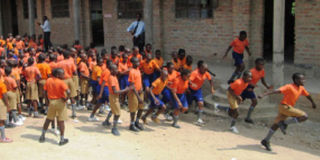Little Angel’s tale of small beginnings

A new structure at Little Angels Primary School in Ntungamo. Photo by Perez Rumanzi
What you need to know:
With their starting capital of about Shs3 million, they set up the school.
From a rented residential house near Ntungamo District headquarters, Little Angels Primary school was established by Patience Kanyesigye who was working with local government then. She had two children in boarding at Kabale Preparatory School, about 60 kilometres away.
On several trips to Kabale District to visit her children, Kanyesigye later suggested the idea of starting a school in Ntungamo to the headmistress, Annie Bagira Tumubweine.
This was then shared with Alfred Niwagaba, a staff teacher at the school. Shifting from a government job to a private school was no easy decision but months later, Niwagaba left.
“Several people get stuck in government jobs; they have ideas but have fear to begin,” Niwagaba said.
By then, there was one private school and there was growing demand for quality pre-primary and primary education as the town’s population kept increasing.
In 2002, they began a a nursery school with four pupils and two teachers. Each child paid Shs80,000 per term, an amount which was slightly more compared to the Shs70,000 that the other schools were charging. However, this didn’t move them. They were sure they would find parents who were searching for quality education.
With start up capital of about Shs3 million, they paid a monthly rent of Shs100,000 and bought some teaching materials and used the remaining amount to pay the teachers’ salaries.
“We started this project in Ntungamo town council after realising we needed to give quality education,” the 34-year old Niwagaba said.
Each year, one class was added. Soon, they bought some land (50 by 100 plot) nearby at Shs500,000. With Shs20 million savings, they started developing the land slowly. This was done in phases.
At first, they constructed three classrooms for nursery and as the numbers increased; they added the primary section. Each year, they would add a class until they got seven primary classes in 2008.
Growth
By 2006, the pupils had grown to 106 from four and they had also started a boarding section with two children.
Today, the school boasts of 400 pupils with 150 boarders on a five-acre piece of land and 35 teaching and non-teaching staff. They have also transformed their structures from wooden classrooms to permanent buildings.
The Christian founded school was licensed by the Ministry of Education in 2007. The fees have since increased to Shs200,000 a term for day scholars and Shs360,000 for boarders.
Achievements
All their eight pioneer pupils sat Primary Seven in 2008 and appeared in first grade, a standard they have maintained to date. In 2013, the Primary Leaving Examinations, the now 12 year-old primary school had its 24 candidates come in first grade and one in second division.
Their investment now stands at Shs600 million.
Teachers’ salary
The teachers’ remuneration has since grown from between Shs100,000 to Shs150,000 a month to Shs280,000 to Shs450,000 depending on the number of years the teacher has spent with them.
Staff is motivated in different ways. For instance, a teacher on duty at the weekend receives an allowance and meals ranging from breakfast to dinner for those interested and monthly airtime for those in administration.
While their consistent Primary Seven performance since 2008 has attracted many parents to take their children to the school, the administrators insist on few numbers.
Niwagaba says they have turned away many requests because they want to protect their standards by keeping a number where they can pay individual attention to each child.
In turn, after balancing their books, they reinvest their profits in the school to improve on the services.
“We believe in creating an all-round child. We support co-curricular activities and encourage parent involvement in the daily running of the school programme.”
They plan to construct their own dormitories and stop renting to ensure that they track the progress of their alumni.




